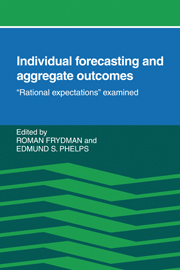Book contents
- Frontmatter
- Contents
- List of contributors
- Preface
- 1 Introduction
- 2 The trouble with “rational expectations” and the problem of inflation stabilization
- 3 Expectations of others' expectations and the transitional nonneutrality of fully believed systematic monetary policy
- 4 The stability of rational expectations in macroeconomic models
- 5 Individual rationality, decentralization, and the rational expectations hypothesis
- 6 Convergence to rational expectations equilibrium
- 7 A distinction between the unconditional expectational equilibrium and the rational expectations equilibrium
- 8 On mistaken beliefs and resultant equilibria
- 9 Equilibrium theory with learning and disparate expectations: some issues and methods
- 10 Keynesianism, monetarism, and rational expectations: some reflections and conjectures
- Index
4 - The stability of rational expectations in macroeconomic models
Published online by Cambridge University Press: 05 June 2012
- Frontmatter
- Contents
- List of contributors
- Preface
- 1 Introduction
- 2 The trouble with “rational expectations” and the problem of inflation stabilization
- 3 Expectations of others' expectations and the transitional nonneutrality of fully believed systematic monetary policy
- 4 The stability of rational expectations in macroeconomic models
- 5 Individual rationality, decentralization, and the rational expectations hypothesis
- 6 Convergence to rational expectations equilibrium
- 7 A distinction between the unconditional expectational equilibrium and the rational expectations equilibrium
- 8 On mistaken beliefs and resultant equilibria
- 9 Equilibrium theory with learning and disparate expectations: some issues and methods
- 10 Keynesianism, monetarism, and rational expectations: some reflections and conjectures
- Index
Summary
The assumption of rational expectations developed by Muth (1961) has been widely employed in theoretical macroeconomic models. The question of the stability of such rational expectations solutions has been considered from several perspectives, some of which have been discussed by Shiller (1978). An important problem is that agents may not know the true values of key parameters, or, more fundamentally, they may not know the true structure, so that they cannot form (strong-form) rational expectations. Taylor (1975) and Friedman (1979) looked at macroeconomic models in which agents were trying to learn the values of certain parameters and considered whether or not expectations would eventually converge to rational expectations. In microeconomic contexts, the problem of learning about parameters using Bayesian techniques in models with rational expectations has been considered by Cyert and DeGroot (1974) and Townsend (1978). Bray (1982) has used a Bayesian process to examine learning in an asset market. More general learning rules have been considered by Blume and Easley (1982) in a general equilibrium context in which different agents observe different signals.
There is, however, a fundamental problem of stability that is present even if the true structure of the economy is completely known. It will be shown that the conventional rational expectations solution can be thought of as an expectations equilibrium. If expectations start out of equilibrium, it will not usually be individually rational for agents to move immediately to the collective rational expectations solution.
Information
- Type
- Chapter
- Information
- Individual Forecasting and Aggregate Outcomes'Rational Expectations' Examined, pp. 69 - 96Publisher: Cambridge University PressPrint publication year: 1984
Accessibility standard: Unknown
- 4
- Cited by
